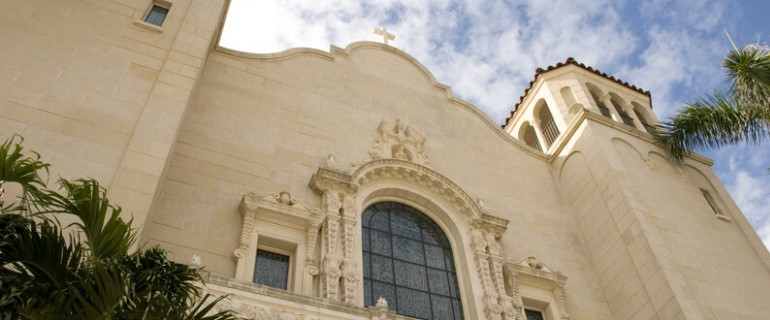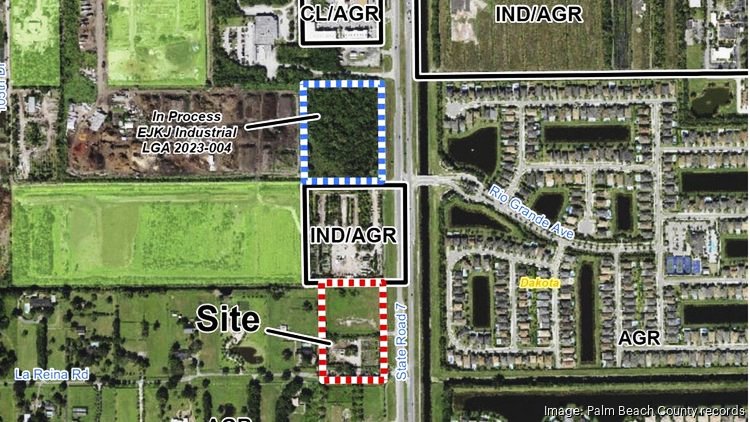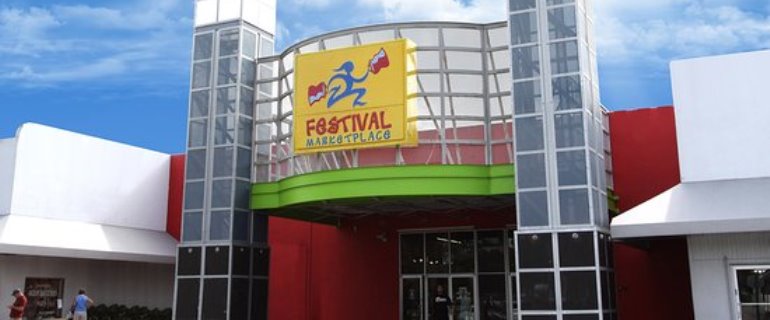Church property in South Florida often attracts developers who want to build something new on sacred ground, due to strong demand for precious land in the coastal corridor from Miami to West Palm Beach.
Nevertheless, church sales and redevelopments are rare in the tri-county area due to land-use and rezoning issues as well as resistance from church members and leaders. But that might be changing. Ascending property values in South Florida and the lingering impact of the COVID-19 pandemic may lead more church owners to put “For Sale” signs on their real estate.
Brokers try to nudge churches onto the market by “cold calling and saying: ‘Hey, do you know your property is worth $50 million today?’ ” said attorney Luis Flores, Miami-based partner of law firm Saul Ewing. “I think a lot of church leaders are going to dip a toe in the water and find out: What is the value of my property? Is it the value that’s advertised when people knock on my door?”
One of the latest listings is a 67-year-old church at 6501 North Avenue in Miami, an 18,800-square-foot brick building with a $4.9 million asking price – or $261 per square foot.
“We have multiple offers on it,” broker Matt Messier said in early March. “South Florida is extremely active.”
Messier is a principal of the brokerage with the listing, Foundry Commercial, an Orlando-based national specialist in sales of churches, schools, camps and other properties owned by religious denominations. He said Foundry brokers about 100 church sales a year nationwide.
“Lately, because the market’s so hot, a lot of churches are sitting on some really good real estate,” Messier said, “So you’re seeing churches being bought to be converted to another use. You’re seeing a lot more of that.”
One of South Florida’s biggest pending sales of a church property would lead to construction of a high-rise condominium in the bayfront backyard of First Miami Presbyterian Church, at 609 Brickell Avenue in Miami. Key International and 13th Floor Investments have offered $240 million for the church’s land on Biscayne Bay for a condo tower project that would preserve the 65-year-old church building that faces Brickell Avenue.
Attorney Cary Tolley, a member of the church, filed a complaint with the Presbyterian authorities to stop the sale of the church property. But the Kentucky-based Presbyterian Office of General Assembly rejected his complaint last September.
“If they build a high-rise condo on the property, that will be the end of it,” Tolley said. “The church will close, and the condo will be all that’s left.”
COVID-19 closed First Miami Presbyterian Church for about two years, reducing Sunday worship to an online-only experience. Tolley said the pandemic cut opposition to a sale of the church’s bayfront property, which had support from the church’s pastor, the Rev. Chris Benek, and by his supervisors at the Presbytery of Tropical Florida in Fort Lauderdale. Neither Benek nor officials at the regional presbytery responded to requests for comment.
“There’s no question that the pandemic played into their hands,” Tolley said. “Benek just wanted to sell the real estate. He’s not a big believer in the importance of in-person worship. He’s one of these guys who believes you can have worship online and have everything done over the internet.”
The pandemic had a simple effect at The Center for Spiritual Living, an aging church in Boca Raton that found a buyer after the pandemic killed cash flow from organizations that rented meeting space at the church.
“When COVID came and all the renters disbanded because no one was meeting anymore, it was a challenge for us because we still had the same expenses,” said the Rev. Jill Guerra, whose mother, Barbara Lunde, is also a minister and controls the company that owns the 3.7-acre church property just south of Palmetto Park Road on Southwest 12th Avenue. “We just realized it was too big of a property for us to maintain.”
In the fall of 2020, Boca Raton-based developer Jay Welchel approached the mother-daughter ministerial team and negotiated a contract to buy the Center for Spiritual Living, then got their consent to extend the closing date of the sale as social distancing and other COVID-era protocols persisted.
“The $4.2 million sale was scheduled to close March 28,” Welchel said in a March 7 interview.
Welchel plans to develop a 128-bed assisted living facility for the elderly on the church site. But he is locked in a court battle with the city government that stems from city staff’s insistence that Welchel’s planned development would require a land-use change for the site.
“If unable to develop an assisted living facility there, I guess my backup would be to put a learning center type of day care at that location,” Welchel said.
“Church sales are different from other real estate deals because the seller often wants to stay on the property,” said attorney Flores. “The uniqueness of church sales is, the church usually wants to stay on the property somehow. It’s not like the typical sale. Those opportunities require the developer to rebuild the church, renovate the church or build around the church, and most developers are savvy enough to do that.”
For example, a church group in Pembroke Pines plans to share its 5-acre property on busy Pines Boulevard with a Wawa gas station and convenience store. The Wawa would replace the existing Trinity Lutheran Church building and its parking lot at 7150 Pines Boulevard. The church, which has operated in its current location since the mid-1960s, will move to a new building to be constructed on the south side of its property, behind the Wawa site, which is vacant. The local city commission voted last year to rezone the site of the planned Wawa and to change its land-use designation.
“A lot of the church groups we work with have a large property – too large for their use. A lot of groups are just trying to right-size their property,” Messier said. “Churches are, other than the federal government, the largest property owners in the country.”
Buying a church isn’t easy, though, even if the bid is rich.
“They are way more complicated than buying a piece of dirt,” said Ryan Shear, managing partner of Property Markets Group (PMG). “Churches are nonprofit, and we’re for-profit, so there’s a lot of education and getting-to-know-you.”
In partnership with Greybook, PMG has built Elser Hotel & Residences, a 49-story, 646-unit condo hotel in Downtown Miami where the First United Methodist Church of Miami occupies most of the first 10 floors.
“The developers have sold more than 50 percent of the building since unit sales began in June 2022,” Shear said in a March 8 interview.
PMG paid $55 million for the 1.1-acre development site at 400 Biscayne Boulevard after responding to a request for proposals from the leadership of First United Methodist to rebuild the church’s previous home, a dilapidated old structure that occupied the site.
Developer Jeff Burns made a bid to redevelop a Lutheran church in Fort Lauderdale that went awry after the church’s out-of-town hierarchy objected, even though he had negotiated a deal with the local leaders of the church to buy the property.
“We had a signed contract. And these guys [the church’s higher-ups] came in and hired an attorney to basically come up with a reason why they didn’t have to move forward with the contract,” Burns said. He decided against going to court to enforce the contract. “It meant suing the church,” he said. “But we’re a community developer, so we decided to move on.”
After that fiasco, Burns stumbled across a nearby church in Fort Lauderdale. He liked the address so much that, after redeveloping it, he moved his business there. He was looking at property across the street when he happened to notice the Gospel Arena of Faith on Northwest Third Avenue, a few blocks north of Downtown Fort Lauderdale and just west of the Flagler Village area. Burns walked into the church, met its owner, the Rev. T.G. Thompson, and asked him if he wanted to sell the church.
“It took a long courtship, if you will, for him to be comfortable and trusting of us,” said Burns, CEO of Fort Lauderdale-based Affiliated Development. “We met him on numerous occasions prior to even submitting an offer.”
Thompson died Nov. 24, 2022, after the sale was completed.
Affiliated Development ultimately paid $2.1 million for the 1.1-acre Gospel Arena of Faith property at 613 Northwest Third Avenue, where the company developed Six13, an apartment building with ground-floor commercial space, which is partially occupied by Affiliated. All 142 apartments at Six13 are so-called workforce housing units, available only to people who earn 80 percent to 140 percent of area median income.
Church redevelopment in South Florida probably will persist, because so many houses of worship occupy coveted locations.
“They have fantastic land,” Burns said. “And a lot of churches have property in areas that are prime for redevelopment. Money isn’t the only consideration because church redevelopments are unlikely to succeed if church sellers don’t like the plan. They would much rather try to figure out a deal with somebody who’s going to do something good on their properties and solve a social need, versus somebody who’s just looking for a profit.”
Source: Commercial Observer




